During speech therapy sessions, responding to ‘When’ inquiries may at times seem like maneuvering through a labyrinth of uncertainties. We’ve all experienced those instances when time appears to elude us, leaving us reaching for clarifications.
But fear not, as we explore effective strategies and engaging activities to unravel the mystery of 'When' in therapy. By understanding the significance of time concepts and incorporating creative approaches, we can help our clients master the art of answering 'When' questions with confidence and clarity.
Let's unravel the secrets together.
Key Takeaways
- Teaching 'When' questions improves children's time comprehension.
- Utilize daily routines and visual aids for effective learning.
- Incorporate calendars to enhance understanding of past, present, and future.
- Engage in interactive activities to practice answering 'When' questions.
Importance of 'When' Questions in Therapy
Understanding the significance of 'When' questions in therapy is paramount for enhancing children's comprehension of time concepts and their ability to respond to time-related inquiries. Time concepts are fundamental for navigating daily routines and understanding the sequence of events. By teaching children how to answer questions about 'When,' therapists can empower them to communicate effectively about past, present, and future events.
Employing specific teaching strategies tailored to time concepts is essential for facilitating learning. Visual aids, such as calendars and daily schedules, play a crucial role in reinforcing these concepts and making them more tangible for children. Engaging children in activities that involve 'When' questions not only makes learning enjoyable but also solidifies their understanding of time-related concepts.
Utilizing games and interactive exercises that focus on 'When' questions can effectively capture children's attention and enhance their ability to grasp the abstract nature of time.
Challenges in Answering 'When' Questions

Children with language delays often encounter significant challenges when asked 'When' questions due to the abstract nature of time concepts. 'When' questions require an understanding of temporal relationships and the sequencing of events. Difficulties in answering 'When' questions may indicate underlying issues with language comprehension.
Here are some key challenges faced when addressing 'When' questions:
- Abstract Time Concepts: Children may struggle with grasping abstract time concepts such as past, present, and future.
- Temporal Relationships: Understanding the order of events and how they relate to one another can be confusing for some children.
- Language Comprehension: Difficulties in processing and understanding language may hinder a child's ability to respond accurately to 'When' questions.
Navigating these challenges necessitates the use of effective teaching strategies that cater to each child's unique learning needs.
Strategies for Teaching 'When' Questions
In our speech therapy sessions, we implement various strategies to effectively teach 'When' questions to children with language delays. We utilize daily routines and calendars as tools to help children understand time concepts.
By incorporating fill-in-the-blank activities focusing on cause and effect 'when' questions, we encourage critical thinking and comprehension. Interactive activities such as snack projects and games are integrated to make learning engaging and memorable. These activities not only reinforce the understanding of 'when' questions but also make the sessions enjoyable for the children.
Additionally, we make use of a variety of resources like worksheets, games, and speech therapy kits specifically designed for teaching 'when' questions. By focusing on different time concepts such as day versus night, seasons, and situational scenarios, we aim to enhance the children's understanding of 'when' questions in a holistic manner.
Incorporating Daily Routines in Sessions

When incorporating daily routines in speech therapy sessions, we aim to utilize familiar activities such as morning routines, meals, and bedtime to teach 'when' questions effectively.
By integrating visual schedules and calendars, we provide structure and reinforcement for time concepts.
Practicing sequencing within daily activities helps children grasp time-related concepts crucial for answering 'when' questions.
Daily Routines Examples
Incorporating daily routines into speech therapy sessions provides structured opportunities for practicing time concepts and sequencing while enhancing children's understanding of the concept of time. Daily routines like morning routines, meal times, and bedtime can serve as excellent examples to teach these concepts effectively. By incorporating these routines, children can learn to answer 'when' questions more proficiently.
Visual support tools such as visual schedules and calendars can further aid in reinforcing these concepts. Moreover, practicing 'when' questions within daily routines not only helps in therapy sessions but also allows children to generalize these skills to real-life situations outside of therapy, fostering independence and confidence.
Routine-Based Therapy Benefits
By integrating daily routines into speech therapy sessions, we create a structured framework that enhances children's ability to comprehend time concepts and sequencing, ultimately improving their skills in answering 'when' questions effectively.
Daily routines provide a practical context for learning time-related concepts, such as before and after, which are crucial for understanding 'when' questions. Through routine-based therapy, children can practice linking activities to specific times, reinforcing their understanding of temporal relationships.
This approach not only aids in language skill development but also promotes independence in daily activities. By incorporating familiar routines like morning rituals and bedtime practices, therapists can help children navigate time concepts more proficiently, leading to enhanced communication and cognitive abilities.
Utilizing Calendars for Time Concepts
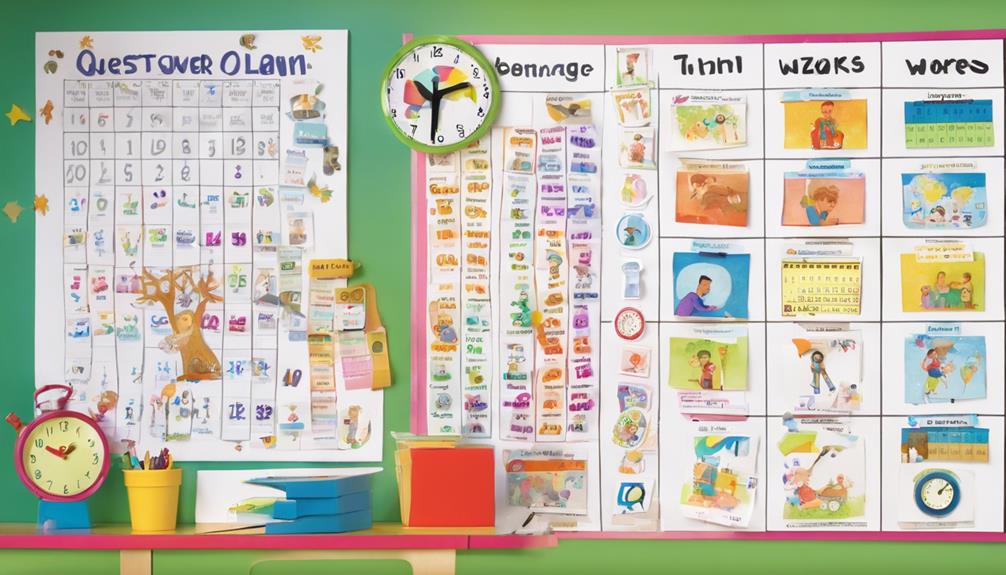
Utilizing calendars enhances the understanding of time concepts in speech therapy sessions. Calendars provide a tangible way to introduce and reinforce the idea of time, aiding in teaching 'when' questions effectively. Here are three key benefits of incorporating calendars in speech therapy sessions:
- Visual Representation: Calendars offer a visual representation of time concepts, making it easier for children to grasp the sequencing of events and understand timing.
- Organizing Daily Routines: By utilizing calendars, therapists can help children organize their daily routines and events, fostering better comprehension of when activities occur.
- Improving Time Awareness: Using calendars can enhance children's awareness of past, present, and future events, thereby improving their ability to respond to 'when' questions accurately.
Incorporating calendars into therapy sessions not only helps children associate events with specific times but also aids in predicting future activities and sequencing events effectively.
Enhancing Cause and Effect Understanding

Enhancing cause and effect understanding in speech therapy involves connecting 'When' questions to daily activities and using interactive techniques to reinforce learning. By teaching 'When' questions, children can grasp cause and effect relationships concerning time concepts. Utilizing daily routines and calendars can help solidify understanding by practicing before/after activities. Fill in the blank activities are beneficial tools to assist children in answering cause and effect 'When' questions, like eating when hungry or bedtime routines.
Integrating activities such as snack or craft projects, playing Clue Junior, and exploring various scenarios can effectively teach 'When' questions. Games, practical tasks, and visual aids play crucial roles in enhancing children's abilities to respond to 'When' questions during speech therapy sessions. These methods not only make learning enjoyable but also encourage active participation and understanding of cause and effect relationships. By incorporating these strategies, speech therapists can create engaging sessions that promote comprehension and retention of 'When' questions.
Engaging 'When' Question Activities

As we explore engaging 'When' question activities, we can consider various activity ideas that incorporate timing practice techniques and progress monitoring tips.
These activities aim to enhance the understanding of 'when' questions through hands-on experiences and interactive learning methods.
Activity Ideas for 'When
To engage students in practicing 'when' questions during speech therapy sessions, incorporate daily routines and interactive activities like snack projects and school calendars. Here are some engaging activity ideas for 'when' questions:
- Snack Projects: Create a schedule for making snacks together, asking questions like 'When do we eat lunch?' or 'When should we prepare our snack?'
- School Calendars: Use school calendars to identify important dates and events, prompting questions such as 'When is the next holiday?' or 'When does the school year end?'
- Clue Junior Game: Play games like Clue Junior that involve deducing 'when' events occurred, reinforcing the understanding of time concepts in a fun way.
Timing Practice Techniques
Engage students in speech therapy sessions by incorporating engaging 'When' question activities that focus on timing practice techniques. Utilize visual schedules to help children grasp time concepts and reinforce their understanding of 'when' questions effectively.
Implement sequencing activities that involve before/after scenarios to enhance sequencing skills, aiding in improved responses to 'when' questions. Introduce fill-in-the-blank exercises to teach cause and effect 'when' questions, fostering critical thinking abilities.
Progress Monitoring Tips
Monitoring progress in answering 'When' questions during speech therapy sessions can be effectively achieved through the use of data tracking sheets.
To ensure advancements in understanding time concepts and responding to 'When' questions, consider implementing goal-setting strategies.
Engage clients in role-playing scenarios to assess comprehension and application of 'When' question responses.
Utilize visual aids such as calendars and schedules to facilitate progress monitoring of 'When' question skills.
Collaboration with parents and educators to collect feedback on the effectiveness of these activities is crucial for adjusting intervention plans accordingly.
Interactive 'Day or Night' Game
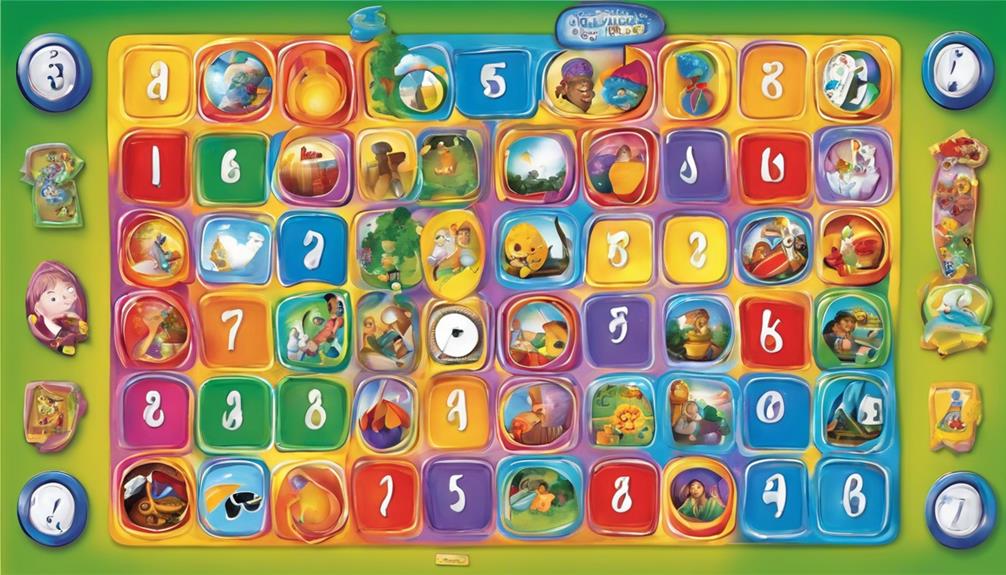
During the 'Day or Night' game in speech therapy, children engage in activities that reinforce their understanding of daytime and nighttime concepts. The game provides structured practice to help children grasp time concepts effectively. By asking questions related to various activities like taking a bath, riding a bike, and eating breakfast, children learn to differentiate between daytime and nighttime tasks. This interactive activity encourages critical thinking and enhances children's ability to answer 'when' questions accurately. Here is a table summarizing the key aspects of the 'Day or Night' game:
| Key Aspects | Description |
|---|---|
| Interactive Activity | Engaging questions to help children distinguish between daytime and nighttime |
| Time Concepts | Focused on improving understanding of time concepts through fun activities |
| Structured Practice | Provides a structured way for children to practice answering 'when' questions |
| Day or Night Game | Reinforces learning by associating activities with specific times of the day |
| Critical Thinking | Encourages critical thinking about time-related activities |
Seasonal 'Winter or Summer' Game

We'll now explore the seasonal 'Winter or Summer' game, focusing on weather-related vocabulary practice, timing, event sequencing, and calendar-based activities.
This game offers children the opportunity to differentiate between winter and summer activities, such as swimming in summer and building a snowman in winter.
Weather-Related Vocabulary Practice
In speech therapy sessions, we engage children in a seasonal 'Winter or Summer' game to practice weather-related vocabulary. This helps them distinguish between activities associated with each season such as swimming, building a snowman, and wearing a coat.
Children learn weather-related vocabulary in a fun and interactive way. Understanding the differences between summer and winter activities is reinforced. The game aids in comprehending time and seasons better.
Timing and Event Sequencing
Engaging children in the seasonal 'Winter or Summer' game provides a dynamic approach to teaching timing and event sequencing concepts in speech therapy sessions. This game focuses on differentiating between winter and summer activities, such as swimming, building a snowman, or wearing a coat. By associating these activities with specific seasons, children can practice answering 'when' questions, enhancing their understanding of seasonal contexts.
Through this game, kids develop the ability to comprehend and respond to when questions based on the timing of events in different seasons. The interactive nature of the game makes learning fun and engaging, allowing children to grasp timing concepts effectively while enjoying seasonal activities.
Calendar-Based Activities
Utilizing a calendar-based approach, the seasonal 'Winter or Summer' game in speech therapy aids children in distinguishing activities linked to winter and summer seasons. This activity helps children grasp time concepts, understand seasonal differences, and develop critical thinking skills.
- Children learn to associate swimming with summer and building a snowman with winter.
- They practice identifying the appropriate season for activities like wearing a coat.
- The game encourages children to think critically about when specific activities typically occur in relation to the seasons.
Situational 'When' Question Game
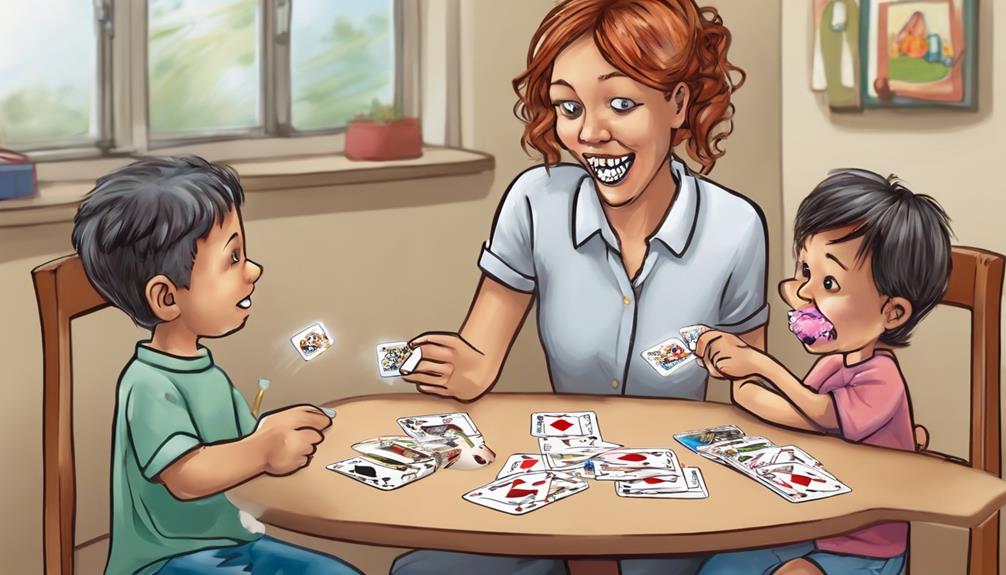
The Situational 'When' Question Game challenges children to think critically about time concepts in various scenarios. This interactive activity is a valuable tool in speech therapy sessions to teach WH questions and enhance language skills. By prompting children to provide 'when' responses to different daily activities such as washing hands, eating, and sleeping, the game helps them apply their understanding of time effectively. The practical approach of this game encourages children to think about time in real-life situations, improving their comprehension and communication abilities.
| Benefits of the Situational 'When' Question Game | |
|---|---|
| Enhances critical thinking skills | Promotes practical application of time concepts |
| Improves language skills | Encourages active participation in speech therapy sessions |
Resources for Teaching 'When' Questions
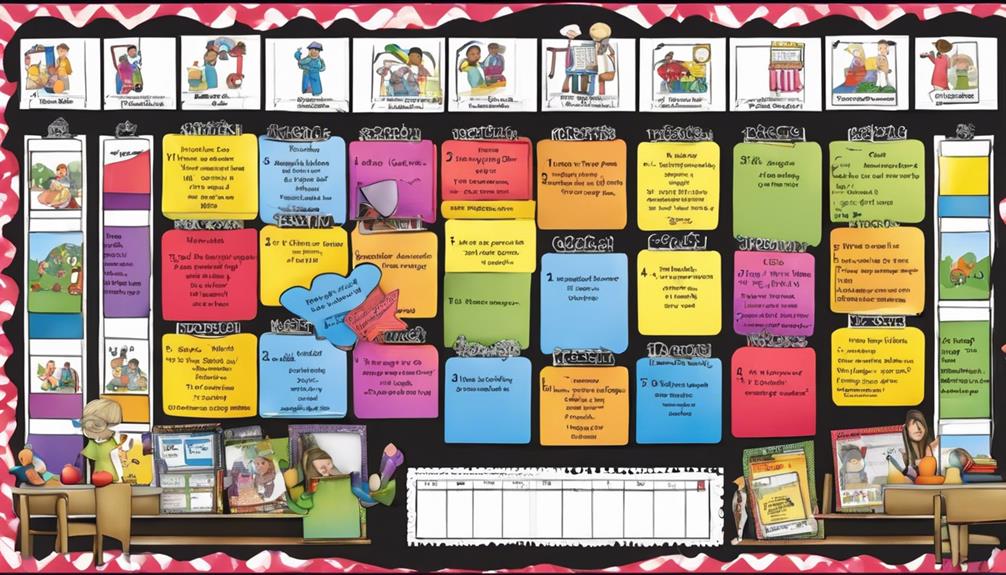
When teaching 'When' questions in speech therapy, we recommend utilizing visual schedules and calendars as effective tools for reinforcing time concepts. To enhance understanding and engagement, incorporating daily routines and activities can provide practical contexts for learning. Additionally, interactive games focused on time concepts can make learning 'When' questions more enjoyable and memorable.
Visual schedules and calendars: These tools help create a visual representation of time, making it easier for individuals to grasp the concept of 'When' questions.
Daily routines: By linking 'When' questions to everyday activities, such as meal times or bedtime, individuals can apply their knowledge in real-life situations.
Interactive games: Engaging in games that require answering 'When' questions can make the learning process interactive and fun, increasing motivation and retention of time concepts.
Fun Activities for 'When' Questions
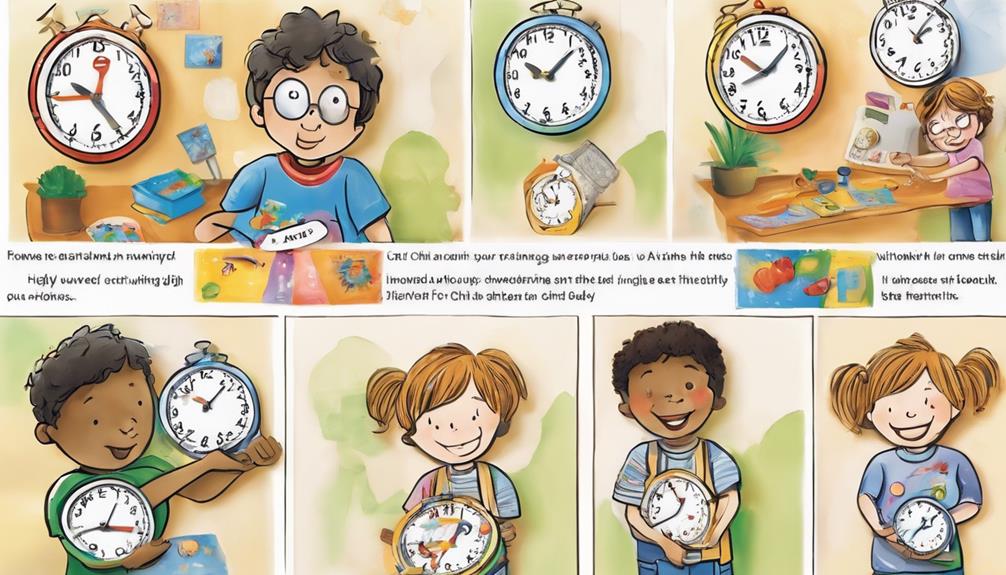
Engaging in interactive activities is a key component of teaching 'When' questions in speech therapy sessions. To make learning enjoyable, incorporating fun activities into sessions can be highly beneficial.
Snack or craft projects provide a hands-on experience while practicing answering 'when' questions. Using school calendars as visual aids can help in understanding time concepts related to 'when' questions in a practical way. Games like Clue Junior, which involve solving mysteries, can be a playful yet effective method to practice answering 'when' questions.
Exploring various activities tailored for teaching 'when' questions in speech therapy sessions can keep the sessions engaging and productive. By incorporating games and practical tasks, therapists can reinforce the learning of 'when' questions in a way that's both enjoyable and educational for their clients. These activities not only make the learning process more fun but also help in enhancing comprehension and retention of the concepts related to 'when' questions.
Targeting Time Concepts in Therapy
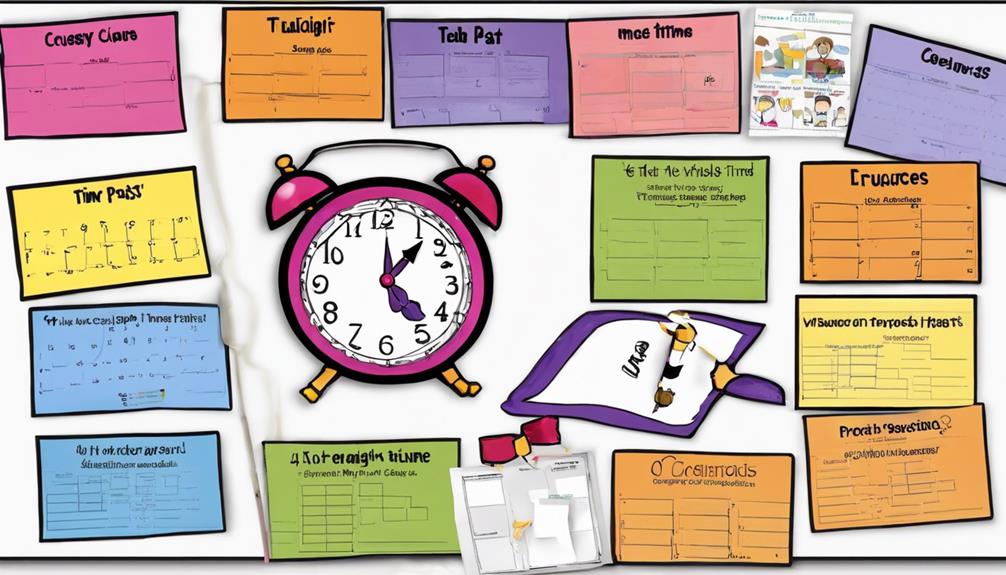
To effectively target time concepts in therapy sessions, incorporating daily routines and calendars can serve as valuable tools for enhancing children's understanding of time-related concepts when answering questions. Daily routines provide a structured way to introduce time concepts in a practical manner, while calendars offer a visual representation of time passing. By implementing these strategies, children can grasp the sequencing of events and learn to associate specific times of day with different activities.
- Daily Routines:
Establishing consistent daily schedules can help children develop a sense of time and understand the sequence of events throughout the day.
- Calendars:
Using visual aids like calendars can aid in teaching children about days, weeks, and months, allowing them to visualize the passage of time.
- Sequencing:
Engaging in activities that require sequencing events in chronological order can reinforce understanding of time concepts and improve the ability to answer 'When' questions accurately.
Supporting Clients in Answering 'When' Questions

When supporting clients in answering 'when' questions, we focus on using time-related cueing strategies and visual timeline tools to enhance comprehension.
These tools help individuals grasp the concept of time and sequence events accurately.
Time-Related Cueing Strategies
Utilizing visual aids like calendars, clocks, and schedules can significantly enhance clients' ability to respond to 'When' questions in speech therapy sessions. Time-related cueing strategies involve incorporating context clues, daily routines, and before/after sequences to support clients in understanding and answering 'When' questions effectively.
Here are three key techniques to assist clients in improving their time-related comprehension:
- Providing context clues and prompts related to daily routines and events
- Using before/after sequences and time markers such as yesterday, tomorrow, and next week
- Implementing structured routines and repetitive practice
Visual Timeline Tools
Visual timeline tools play a crucial role in speech therapy sessions by providing a clear sequence of events to assist clients in understanding and answering 'When' questions. These tools incorporate pictures, symbols, or words arranged chronologically to help individuals grasp the concept of time. By utilizing visual timelines, clients can enhance memory recall and comprehend past, present, and future events related to 'When' questions.
Engaging with visual aids like timelines enables clients to practice sequencing events and develop a deeper understanding of time concepts during speech therapy sessions. The use of visual timeline tools not only enhances engagement but also facilitates learning, ultimately improving clients' ability to effectively respond to 'When' questions.
Frequently Asked Questions
How Do You Answer Why Questions in Speech Therapy?
When answering 'Why' questions in speech therapy, we encourage reasoning and understanding cause and effect relationships. It's crucial to connect 'Why' questions to personal experiences for better comprehension.
Various strategies, like visual aids and real-life examples, help prompt children to provide logical explanations. Monitoring progress involves observing the child's ability to reason and explain different situations.
It's essential to foster critical thinking skills in responding to 'Why' questions effectively.
What Is the Hierarchy of Questions in Speech Therapy?
At the core of speech therapy question hierarchy lies a structured progression from simpler to more complex inquiries. Starting with concrete questions like 'what,' we gradually advance to abstract ones like 'when.'
Mastering lower-level queries is crucial before tackling higher-level ones. This methodical approach fosters critical thinking and enhances comprehension skills.
Building a solid foundation with fundamental questions is key to confidently navigating the more intricate aspects of speech therapy question hierarchy.
How Do You Work on Where Questions?
When working on where questions, we focus on teaching spatial concepts related to location. We use visual aids like maps, calendars, and role-playing scenarios to help children understand and respond accurately.
Activities involving identifying locations and using prepositions like 'in,' 'on,' 'under,' are essential. We also incorporate games and interactive tasks to make learning fun and engaging.
How Do You Make a Speech Therapy Session Fun?
When we make a speech therapy session fun, we engage our clients through interactive games like Zingo and memory games. By incorporating sensory bins with themed activities and utilizing sticker books, picture scenes, and interactive technology like Boom Cards, we create a dynamic and enjoyable learning environment.
Collaborating with educators and parents helps us enhance the fun factor by incorporating diverse language targets and interactive resources. Visual aids, such as wordless picture books, further enrich our sessions.
Conclusion
In conclusion, by incorporating interactive activities, visual aids, and practical tasks into speech therapy sessions, children can improve their ability to answer 'When' questions and understand time concepts better.
Engaging in games, hands-on activities, and collaborative approaches can make learning fun and effective for children with language delays.
It's important to reinforce time-related skills through daily routines and utilize resources like calendars to support clients in mastering 'When' questions.











